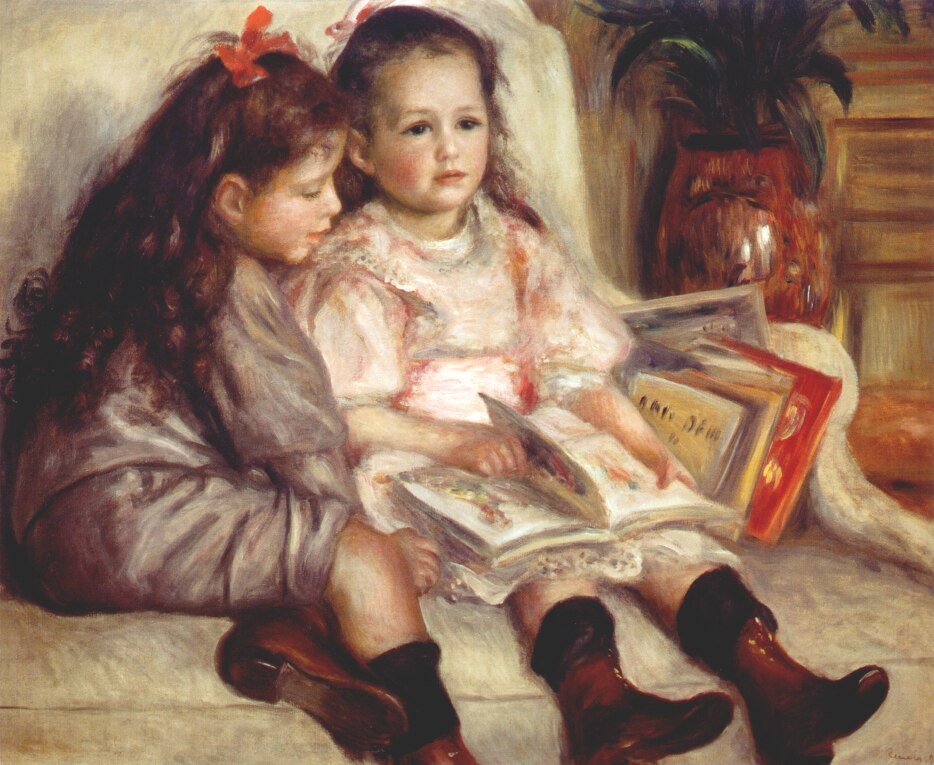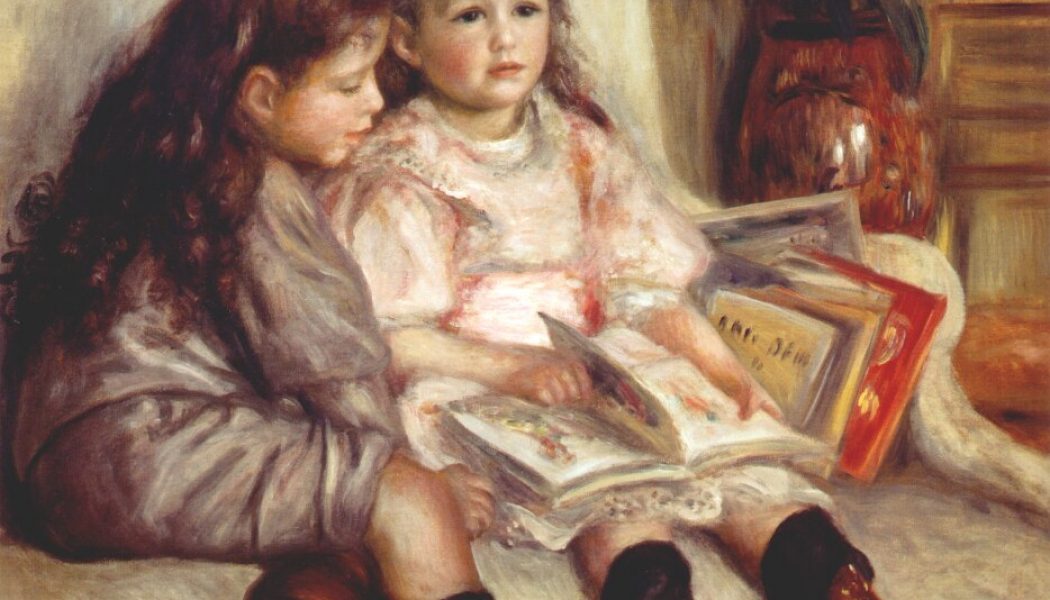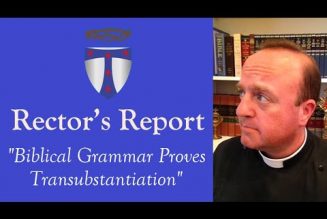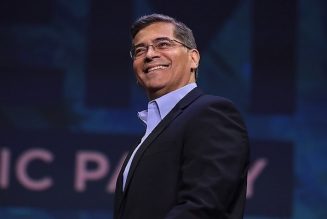
This past March, the American education system underwent its most significant transition since World War II. As Spring came, the pandemic forced all education, public, private, lower, and higher to a temporary halt. Schools pivoted and transitioned as best they could to online, remote, and hybrid methods of education. Likewise, parents attempted to adjust to the new normal. Unlike other abnormalities brought on by the pandemic, which is now in its seventh month, the transition to the home as the place of education was actually a return to normalcy, albeit an uncomfortable one for many. With the exception of those who already homeschooled, most parents assumed a role that, while inherently belonging to them, is typically not emphasized.
Despite strong evidence, most parents underestimate their role as primary educators. Study after study demonstrates that children learn the most enduring lessons of life from their home, parents, and surrounding family. The questions of origin, purpose, destiny, forgiveness, self-worth, etc. may be re-enforced in the classroom, but they take root in the home. The pandemic has revealed several truths about education in general and the strengths and weaknesses of the American education system. With parents considering their options this Fall, and the momentary reminder of the home as a place of education, and the limits of our modern education system, it’s worth reviewing the important role parents play and how this plays out in the various educational settings they choose for their children.
Parents Matter
The emerging collection of anecdotal and peer-reviewed studies focused on student participation and achievement reveal one consistent truth. Parents matter. Children whose parents are more involved in their education have better attendance, higher grades, and above-average graduation rates. This type of correlation is to be expected. It only follows reason that parents who are more involved in their children’s education are more likely to seek out better schools, ensure participation, help with homework, etc. Like all correlatives, it does not prove causation. But while there are many factors to a child’s success in school, these studies do reveal a deep truth about the instrumental role parents play. A role that is often acknowledged but less often seriously engaged by modern education.
In the stripped away schooling of this past year, students without parental intervention were left to their own devices, figuratively and literally. The current crisis and the response in Spring 2020, more fully exposed the significant equity gap for lower-income families. Many of these studies point out that students from lower-income families are less likely to have two parents at home, and less likely to have the internet and device access that remote education depends on. But this is only part of the story. Students of lower-income families whose parents took an active role as primary educators fared much better overall. This includes single-parent homes, which now make up 25% of households of school-aged children in the US (the highest rate in the world). They more successfully advocated for the resources they needed, and often overcame any gaps by taking the onus of education upon themselves. At the same time, these studies indicate that while more affluent families with greater access to resources did not suffer in the same way, there were similar losses in retention and performance among those students whose parents outsource their role as primary educators rather than embrace it.
Four Golden Calves
As the principal author of one of these studies (The Impact of Coronavirus on K-12 School Attendance, Performance and Culture, San Juan Diego Institute, May 18th, 2020) I find this correlative between parent involvement and student achievement illustrative of the deeper challenges our current educational system faces. It also provides a context in which to create the solutions to more equitable and effective models of education. For far too long parents have outsourced the education of their children in ways that damage rather than build up their role as primary educator. This has been to our detriment and we continue to see the failures of our current system exposed, especially during this time of crisis. The modern education construct is based on some failed assumptions of social engineering and pragmatism that many parents experienced first-hand as they were confronted with trying to manage, replicate or intervene with the many misguided norms of modern education while at home. These failed assumptions include several golden calves that have deserved smelting for some time. As an educator, and as one who continues to teach educators, I can attest to the truth that good teachers suffer from these fallacies as much as their students. Many teachers succeed at educating our children despite the environment created by the educrats who seek a never-realized utopia, forever dependent on just a little more power and a little more funding. These challenges are not the fault of the teacher, but rather that of a system that has combined well-funded good intentions with bad anthropology.
The first idol is the pre-eminent focus on pragmatic and technical knowledge. For most of the history of western civilization, education was built upon the foundations of knowing how to think and communicate. This was the basis of self-discovery and personal development as well as civil dialogue and civic duty. The idea was that the subjects of grammar, logic, and rhetoric created the basis for reading, writing, speaking, and thinking rationally, which were necessary for more advanced subjects of math, music, astronomy etc. This approach was represented in the classical trivium and quadrivium model which undergirded nearly all educational systems in the western world. Even those systems not linked to our Greco-Roman and Judeo-Christian heritage, followed similar courses of thought. To be educated meant to know who one was, and how one was called to live in this world. How different western perspectives are today, when to be educated means to be good at some thing and/or employable. Having skills and being employable are very important, but they are insufficient to provide a vision for the whole of education, nor the whole of life. In other words, education focused on purely practical, efficient, or economic ends, can too easily forget the important foundations upon which all good work is founded.
Sadly, this focus invades private and home education as well, where the human foundation of education, the formation of the moral imagination, and the development of virtue can be sidelined by a pressure to compete with public schools. In the words of one of my former student’s father, “I am happy that he got a good grade, but is my son any less of a jerk after your class.” The humorous question was an honest one. You have given them more knowledge, but have you directed it towards what is good, beautiful, and true? While it might not be my job as a teacher to prevent his son from becoming a villain, I certainly shouldn’t add to the problem. In this regard, the shortcomings of the modern education system are perhaps best summarized by C.S. Lewis’ Abolition of Man, Reflections on Education with Special Reference to the Teaching of English which opens with the darkly humorous stanza, “We laugh at honour and are shocked to find traitors in our midst. We castrate and bid the geldings be fruitful.” Or if you prefer a slightly more modern, cinematographic allusion, Dr. Ian Malcom played by the quotable Jeff Goldblum who, in Jurassic Park, points to the technical ability bereft of reason and humanity, “your scientists were so preoccupied with whether or not they could, they didn’t stop to think if they should.”
As primary educators we must provide a foundation for our children built upon an adequate understanding of their dignity. They were created for something more than just to do some thing or to have a high-paying job. We must help them answer the fundamental questions of life their origin, purpose, destiny, and inspire them to virtue and to seek meaning in life, and to be willing to ask the questions of “why” not just the utilitarian questions of “how.” We must demand that those we entrust to educate them see the value in that foundation. This is not a particularly religious proposition. Much of what is good, beautiful, and true of humanity is part of our universal heritage as humans. Common decency, basic objective morality of good and bad behavior, and the consequences of such actions are important life lessons for both the physical and emotional life of the child. In private religious schools, we should teach, inspire, and hold students accountable to moral behavior becoming of who they are called to be. In public or charter schools, we should teach them the civic morals of integrity, civility, justice, cooperation, and the common good.
The second idol of modern education is related to the first; an overemphasis on materialism and empiricism. While the study of the material world is indeed the rightful domain of the sciences, not everything is material. Our thoughts, our hopes, our ambitions, those things that are so human that we rarely actually think of them, are also the domain of education. Science, properly understood, is the study of observable, repeatable, material phenomena. It is an excellent way to learn about the physical world. But it is not the only way to learn about truth. Most of the college students I have taught suffer from a type of anxiety that comes from being told their entire life that we can know everything about the material world, but nothing about the immaterial world. Things like purpose, destiny, happiness, love, meaning, fulfillment either remain a mystery or are insufficiently explained by some physical phenomenon. Working for years at a large public research institution I heard them all. “Love is a stimuli response to endorphins in the brain that have been meticulously conscripted by eons of natural selection by which people with more developed pituitary glands had higher procreation and reproductive rates due to an associated willingness to form interpersonal relationships with successive partners.” “Dude, I just wanted to know if I should ask her to the dance.” All this to say, that the preference for the inductive methods of reasoning, the focus on technique, and interaction with the physical world, does not simultaneously equip us for the deeper and more important questions of life. I tell all my freshman students that if they leave four years of college with a deep knowledge in their degree field, but nothing more about who they are, what fills their heart with joy and breaks it with sadness, and nothing more about how to make a gift of themselves to others, then they have failed at college. The same is true for every grade and every age.
As primary educators, we must show our children that the world in all of its goodness is more than just the sum of its parts. We must inspire humility, awe and wonder, and appreciation and stewardship of the natural world. As parents, our children should know that we are as excited for them to discover their mission in life as they are. An education system that overly relies on empiricism is more likely to encounter our children as problems to be solved, not as learners to be accompanied towards truth. The focus becomes how to more efficiently deliver the content, or teach the skill, which while important, cannot outweigh the veracity and meaning of what they are being taught. We live in a technological world, and skills and technique matter, but are exercised well to the extent to which the people that use them have the ability to guide their use towards what is really good, beautiful, and true.
The third idol is the idea that national and federal norms represent and/or exceed the regional realities, economic and otherwise, of a local place. Certainly, there are basic human norms that every person needs as discussed in the previous paragraphs, as well as basic knowledge that all citizens must have to support a constitutional democracy. But to federalize the bulk of education on the precept that everyone needs the same thing, or even worse, to defend the practice of violating subsidiarity under the pretext of making sure no one is left out, is unbecoming of a nation whose motto is e pluribus unam. Despite the best of intentions, federal norms often leave more children behind, and less equipped to meet the actual realities of the place in which they grow-up, and God-willing, continue to live, work and raise families. The goal should not be for children of pig-farmers in Iowa to know all the same stuff as children of stock traders in New York. Chances are that kids in Manhattan may be offended by a field trip to the slaughterhouse, and kids in Des Moines not served well by a day at Wall Street. And if such a thing were to benefit these children, parents can provide the opportunity. It should not fall on our broken educational system to make universal decisions in place of what local competent authorities can decide. It is naive to believe that children are better off if they all know the same stuff, especially if that stuff is determined not by human nature, but by shifting economic and political realities. We reject the trivium and quadrivium as nostalgic, inefficient, and outdated, yet we build a standardized system on fluid and changing social norms.
As primary educators, you are right to ask what is valuable to all people, to all citizens, as well as particular to your family, your region, your state? What things ought your children learn that will make them a better member of your community? As the primary educator you are constantly asking what your child needs, and what things will matter for them when they come to more fully realize their ambitions. As your partner in education, the school, the curriculum, etc. should speak to these needs, and you are well within your right to advocate for them. Your taxes provide these services and your represented officials, or their delegates, are meant to serve the people they represent.
Fourth is the fact that we often hide behind decisions that are supposedly made for the benefit of the child. The fact is, many of the decisions that we have made and continue to make for how our schools educate, have been made for economic and not educational considerations. Most of these decisions are not necessarily bad for our society, but we cannot say in good conscience that they are good for our children. The younger age of schooling, for example, can tout better test-taking skills in proceeding years, but the decision to educate children younger was based largely on an economic system that depends on two working parents, not a perceived dilemma in test-taking ability. A three and a half year old is likely better off at home with his or her parents, then in a class of strangers. The same logic follows regarding the length of day, all day pre-school, co-ed classes, etc. In fact, much of the educational research that may justify these things simply points to gains within the educational system itself, while other data shows the real cost to students and families. The same is true for programs that apply to all children so as not to discriminate against those who do not need it.
A clear example of this type of thinking was a summer food program in Phoenix. It is noble, good, and just that schools who are already ensuring the nutritional health of children during the school year continue to do so during the summer. But a Phoenix school district continued food service for all students during the summer and made it free so as not to make students who needed the service sign up for it. The net result was the local elementary school fed affluent families and threw away what they could not send home with staff. This type of waste whether it be food, books, devices, or services, is rampant, and it does not help our children, and it further directs resources away from those who need it most. Let’s face it, it is okay to make prudent decisions that may negatively affect our children for the purpose of some greater good, it is not okay to pretend we are making these decisions on their behalf.
Despite the failings of our current system, these false idols are vehemently defended. And we struggle to imagine what the alternative might look like. It is indeed hard to imagine. Parents often feel that they cannot and should not attempt to compete with what is provided by the “expert” in the classroom failing to recognize that well-ordered classrooms simply mimic what families naturally provide on their own; a structure for cooperation, communication, and learning. To be clear, all forms of organized schooling (public, charter, private, and homeschool) have distinctive benefits, but these benefits need not come at the expense of usurping the parents’ role as primary educator. It was one of our central findings that schools which take seriously their partnership with parents, and honor parents as the primary educator of their children performed better overall. Good teachers know this, and they succeed precisely because of their willingness to serve as paternal (or more often than not) maternal partners, not surrogates, but real partners —representing what the parent wants most for their children, which is not just to pass the class, but to also become more of who they are called to be. Many successful schools interact with parents in ways that inspire and empower them to serve as primary educators with greater skill and confidence. Many of these schools coincidently don’t succumb to the extremes of the four challenges outlined above. They approach the enterprise of education and the families they serve with less hubris and more humility.
Ultimately the data supports the axiom: children learn from their parents. Parents want what is best for their children, even those who don’t always know how to give their children what they need. After all, this truth is ancient. It is even biblical —Jesus asked the crowd, “Is there anyone among you who, if your child asks for bread, will give a stone? Or if the child asks for a fish, will give a snake?” (Matt 7:9-10) Good parents want what is best, and seek to provide the fundamental goods of food, water, shelter, and education for their children. In today’s world, most parents will not allow anyone, be it government, neighbors, or in-laws, to tell them how to provide the goods of food, water, and shelter for their children. Only in severe situations does the common good demand intervention. Much of the education of our children, however, is determined not by parents, nor by teachers, nor even the common good, but by other less fundamental factors made by more remote and separate decision makers. These decision makers are not nameless men in black suits in smoke-filled rooms, hatching nefarious plots. But the well-intentioned guidance of ‘experts’ has slowly eroded parents’ God-given and natural role in the rearing and educating of their own children. A return to normalcy is needed, the data demands it, and our children and families deserve it. Perhaps this is why 40% of public school parents said that they lost confidence in the education system and were considering homeschooling for fall of 2020.
What is the solution?
The family is the locus of our development. Our first steps, our first words, our first lessons are learned in the home. How we relate to others, build virtue, eat food, worship, play, forgive, and love are all learned for good or for naught in the home. Parents play a central, enduring, and irreplaceable role as the primary educators of their children. The way parents fulfill this role is a matter of prudence, but it is never passive, nor can it be abdicated to another. Our schooling system must radically rethink how it partners with and assist parents in this role, for the benefit of the child, the family, and the community. This crisis will have been wasted if it does not cause us to want more for our children, our families, and our nation.
As everyone seeks to fix the problems caused and exposed by the pandemic, governments, philanthropists, policymakers, and districts should be seeking to increase efforts to meaningfully support parents as primary educators. This will require some radical changes, and challenge existing norms of the pragmatic paradigm that undergirds most modern education. Furthermore, parents should forcefully reclaim their rightful role. For some, this will mean more involvement in their public school to ensure that what their children are learning is consistent with the needs of the family and community. For others, it will mean partnering with their private school teachers and administrators to re-think how the school can engage, empower, and support the home as the locus of education. For others, it will mean taking more seriously home education, whether that be education delivered remotely to the home by others, or more traditional forms of homeschooling where the parent serves as the principal teacher. Regardless of how we decide to best school our children, this return to normalcy will mean reclaiming our children as our own, prayerfully discerning what they need, and once again becoming their first teachers.









